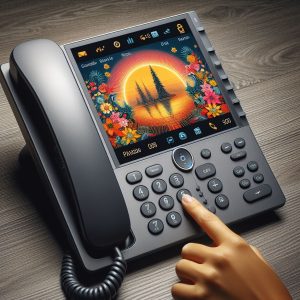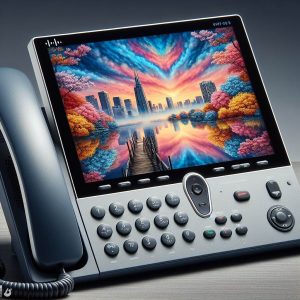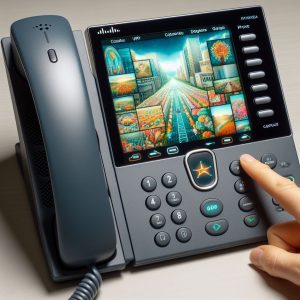Introduction
Voice over Internet Protocol (VoIP) represents an advanced phone system technology that enables voice calls over IP data networks rather than traditional analog phone lines. Cisco Systems produces some of the most widely used VoIP desk phones and wireless IP phones for enterprise environments.
Cisco offers several phone series with distinct features and capabilities to address different business needs and budgets. Models range from basic VoIP lines for knowledge workers to advanced executive desktops and conference units. Cisco VoIP phones integrate securely into the networking giant’s wider infrastructure solutions.
Key benefits of deploying Cisco VoIP phones include scalability, reliability, sound quality, security, and unified communications. Cisco’s phones simplify business calling through intuitive interfaces, rich HD audio, and seamless integration with Cisco’s Call Manager software.

Cisco VoIP Phone Models
Cisco produces VoIP desk phone models across several product generations, each improving upon the capabilities of previous versions. Current Cisco VoIP desk phones fall into these primary series:
Cisco Unified SIP Phone 3900 Series
The 3900 Series represents Cisco’s most affordable desk VoIP line optimized for basic voice calling. Models in this line include:
- Cisco Unified SIP Phone 3911
- Cisco Unified SIP Phone 3931
- Cisco Unified SIP Phone 3941
The 3900 Series only supports the SIP VoIP call protocol. It lacks some advanced features but offers an easy endpoint for SIP trunking rollouts.
Cisco Unified IP Phones 6900 Series
The 6900 Series delivers value-focused VoIP with full UC capabilities at a reasonable price point. Select models include:
- Cisco Unified IP Phone 6921
- Cisco Unified IP Phone 6945
- Cisco Unified IP Phone 6965
These phones support both SIP and Cisco’s proprietary SCCP call protocols across data networks. Models come with grayscale displays and navigation clusters.
Cisco IP Phone 7800 Series
Cisco’s 7800 Series marks the vendor’s first major VoIP desk phone redesign since the 6900 line. Updated models include:
- Cisco IP Phone 7811
- Cisco IP Phone 7821
- Cisco IP Phone 7841
Designed for executives and managers, the 7800 Series boasts color displays, ergonomic curves, and easy customization. Enhanced audio quality enables rich voice communications.
Cisco Unified IP Phones 7900 Series
The 7900 Series represents Cisco’s previous flagship VoIP desktop models, including:
- Cisco Unified IP Phone 7906
- Cisco Unified IP Phone 7911
- Cisco Unified IP Phone 7940
- Cisco Unified IP Phone 7960
This extensive line spans affordable entry-level to high-end executive models. The 7900 family marked Cisco’s transition to color screens and WiFi support.
Cisco IP Phone 8800 Series
Cisco’s newest premium business media phones, the 8800 Series comprises:
- Cisco IP Phone 8811
- Cisco IP Phone 8841
- Cisco IP Phone 8851
- Cisco IP Phone 8861
Flagship features include high-resolution color touchscreens, HD video, superior audio, and sleek industrial design. The 8800 line brings executive desktops into the mobile smartphone era.

Security Features of Cisco VoIP Phones
Cisco prioritizes security and privacy across its VoIP endpoint offerings:
Encrypted Signaling/Media – Cisco phones utilize the Secure Real-Time Transport Protocol (SRTP) to encrypt voice data flows and signaling. This prevents eavesdropping or interception.
Authorization and Authentication – Phones only work when successfully authorized against a Cisco Unified Communications Manager or other supported call controller. This prevents rogue endpoints from entering the network.
Cryptography – Encryption relies on strong cryptographic algorithms including AES 256 bit encryption. Phones use TLS v1.2 and SSH for secure remote access.
Content Protection – Digital Rights Management protects licensed audio content distributed to IP phones.
Advanced models like the 8800 series also support Security Assertion Markup Language (SAML) single sign-on to enable secure passwordless workflows.
Overall, Cisco VoIP phones integrate robust security capabilities to safeguard calling environments against various threats. Organizations can deploy them at scale confidently thanks to Cisco’s enterprise-grade protection and reliability.
Hardware and Functionality
Cisco VoIP phones all contain similar core hardware to enable voice calling over IP data networks:
- Display – All models include LCD screens ranging from monochrome to HD color for visual feedback.
- Network Port – An RJ-45 ethernet port connects each phone to wired data for power and connectivity.
- Wideband Handset – Handsets maximize audio quality with advanced acoustic technology.
- Speakerphone – Built-in full-duplex speakerphones enable handsfree calling and conferencing.
- Soft Keys – Buttons below the display facilitate call features and phone menus.
- Keypad – Standard telephone keypads allow dialing numbers and inputting information.
More advanced models add extras like color touchscreens, Bluetooth support, WiFi connectivity, and video cameras.
On the software side, Cisco VoIP phones run an optimized version of Linux as an embedded real-time operating system. Phones interoperate with Cisco Unified Communications Manager for intelligent call routing, management, and unified messaging.
Cisco’s VoIP phones continue the company’s strength in tightly integrating software, hardware, and services to optimize performance.
Administration and Support
Cisco provides extensive resources to assist customers with VoIP phone deployment and management:
- Administration guides cover configuration, firmware, security, and troubleshooting topics to simplify phone system management.
- End-user guides help employees use phone features, customize settings, and address common issues.
- Cisco support services assist with technical issues, replacement parts, and optimizing phone system performance.
- Online self-help resources include user forums, knowledge bases, FAQs, and training materials.
Cisco also offers Network Setup Assistant software to simplify deploying phones. Admins can configure devices in bulk before rollout rather than individually on-site.
Overall, Cisco allows customers to deploy VoIP at scale with comprehensive documentation, training, and support. Resources help optimize phone systems while reducing administrative overhead for in-house teams.

VoIP Wireless Network
Cisco’s wireless IP phone offerings integrate with Cisco’s leading WiFi infrastructure platforms. Wireless VoIP endpoints authenticate against Cisco Unified Communications Manager using Cisco Discovery Protocol (CDP).
After initial configuration, Cisco wireless IP phones automatically detect WLAN availability. The phones associate securely with the enterprise wireless network via protocols like Extensible Authentication Protocol (EAP) for network access control.
Roaming is supported to enable mobility between wireless access points across a corporate campus or office space. Wireless phones maintain continuous secure connectivity during roaming transitions.
Cisco wireless IP phones deliver the advantages of mobilizing business voice communications. Employees can securely make or answer calls without being tethered to a desk. Cisco provides the end-to-end infrastructure to maximize wireless VoIP performance.
Conclusion
Cisco offers a comprehensive VoIP desk phone portfolio combining reliability, security, and enterprise phone system integration. Models ranging from basic IP phones to advanced multimedia units give businesses telephony options tailored for different needs and budgets.
Backed by Cisco’s industry-leading phone system management, switching, and network infrastructure, customers can feel confident in rolling out Cisco VoIP endpoints across global sites. The phones seamlessly interoperate for unified communications backed by strong security and ongoing firmware support.
With voice technology playing an integral role in modern collaboration along with video and messaging, Cisco VoIP phones position organizations for the future of work. Reliable wired and wireless IP phones optimize productivity and mobility through convenient calling interfaces. Cisco continues pushing desktop phone capabilities to empower employees wherever their location and workstyle.